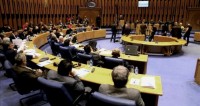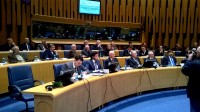Dayton Agreement and the Region 20 Years Later: Further Prospects of the Western Balkans – 15 Years of the Igman Initiative
 The 25th session of the Igman Initiative titled “Dayton Agreement and the Region 20 Years Later: Further Prospects of the Western Balkans – 15 Years of the Igman Initiative” was held in Sarajevo at the Parliamentary Assembly of Bosnia and Herzegovina, on December 12th, with support from the Open Society Foundation from Belgrade and the Regional Cooperation Council.
The 25th session of the Igman Initiative titled “Dayton Agreement and the Region 20 Years Later: Further Prospects of the Western Balkans – 15 Years of the Igman Initiative” was held in Sarajevo at the Parliamentary Assembly of Bosnia and Herzegovina, on December 12th, with support from the Open Society Foundation from Belgrade and the Regional Cooperation Council.
In his opening speech Vehid Sehic, the Igman Initiative Co-president for B&H, stated that in 2002 the Igman Initiative succeeded in bringing together for the first time the presidents of what were then three countries: FR Yugoslavia, Croatia and B&H. The same success was repeated in 2010, when the presidents of the four Dayton Agreement signatory countries met again. That session of the Igman Initiative was significant for establishing a higher level of trust and understanding not only among the citizens but also among the government officials of the four countries. He also stated that the intent of the Igman Initiative to have the Presidency of B&H host this session was met with opposition.
 In view of the twentieth anniversary of the Dayton Agreement, Bosnia is still at the beginning. If we examine where Bosnia is today we come to the conclusion that it is a politically, and thus economically and socially, unstable country. It is time for government officials to leave aside vanity and start acting in the best interest of citizens.
In view of the twentieth anniversary of the Dayton Agreement, Bosnia is still at the beginning. If we examine where Bosnia is today we come to the conclusion that it is a politically, and thus economically and socially, unstable country. It is time for government officials to leave aside vanity and start acting in the best interest of citizens.
H.E. Ms. Maureen Cormack, the US Ambassador to B&H, stated that Bosnia was at the crossroads. Some politicians were looking for excuses to undermine the progress and hide economic shortcomings and corruption. They were misusing the lack of trust among the constitutive nations. “We are urging them to refrain from reacting to escalated tensions and to resolve issues and differences through dialogue”, Cormack said. She pointed to the fact that Croatia had joined the EU and Montenegro had made considerable progress on its path, while relations between Bosnia and Serbia had significantly improved.
After the war Bosnia has proven that the Dayton Constitution can function and that the country can achieve progress within the framework of that Constitution if there is political will. The international community would like for Bosnia to become prosperous and stable. The country has great potential.
Mr. Renzo Daviddi, the Deputy Head of the EU Delegation in Bosnia, expressed regret over Bosnia’s slow progress towards the EU, due to the failure of political parties to reach agreement on the changes to the Constitution. While Bosnia stagnated, the other countries in the region made progress towards the EU membership. Bosnia needs to go through a set of institutional reforms in order to improve the life of its citizens. He also expressed concern about the decision of the Government of the Republic of Srpska to suspend cooperation with judicial and law enforcement agencies at the state level. Bosnia does not need debates on the referendum or arguments between political parties about who the biggest defender of ethnic interests is. Bosnia needs evident economic progress.
 Ivo Komsic, the Mayor of Sarajevo, stated that in the last year or two more had been achieved than in the past eighteen years, due to the fact that different people entered the political scene. “For the past twenty years we were critical about the Dayton Agreement. The time has come for us to focus on the possibilities that the Dayton Agreement provides. The Dayton Agreement, which ended the war in Bosnia, should be viewed from another perspective at this point in time”, Komsic said. He added that the Igman Initiative played an important role in the region as it testified about the joint future of the countries of the region and the possibilities resulting from intensified dialogue and cooperation in all areas.
Ivo Komsic, the Mayor of Sarajevo, stated that in the last year or two more had been achieved than in the past eighteen years, due to the fact that different people entered the political scene. “For the past twenty years we were critical about the Dayton Agreement. The time has come for us to focus on the possibilities that the Dayton Agreement provides. The Dayton Agreement, which ended the war in Bosnia, should be viewed from another perspective at this point in time”, Komsic said. He added that the Igman Initiative played an important role in the region as it testified about the joint future of the countries of the region and the possibilities resulting from intensified dialogue and cooperation in all areas.
The second panel of the session focused on the Igman Initiative Policy Paper “Twenty Years of the Dayton Agreement”. Jovan Teokarevic and Nerzuk Curak, the co-authors of the Paper, addressed the participants during this panel.
Jovan Teokarevic pointed out that the enlargement fatigue within the EU and the reform fatigue within the Western Balkans were “supporting” each other and had serious and long term negative consequences for the stabilization and progress of the region. The economic crisis in most countries was, and is still, more devastating than in other parts of Europe, primarily because the local economies, emerging from the transition recession, were not sufficiently reformed and prepared for such serious external shocks that sharply reduced foreign investment and export opportunities. During the reporting period, there was an alarming deterioration in the democratic performance of all the countries of the Western Balkans. Overall, the region is characterized by the lack of the rule of law, judicial independence, media freedom and pluralism and political consensus, with noticeable trends and rise of organized crime, tabloidized media, intolerance, authoritarian regimes, etc.
Nerzuk Curak highlighted that at this point in time an interesting and almost dangerous paradox surfaced. At the moment when the EU has published the most positive progress report for Bosnia and Herzegovina, we are witnessing actions aimed at overturning the Dayton Agreement. One of them is the decision of the National Assembly of the Republic of Srpska to hold a referendum on the authority of the state and international institutions. Another one is the decision of the Government of the Republic of Srpska to suspend all cooperation with the state-level police, court and prosecution. It could be concluded that the interpretation of the Dayton Agreement in the past several years has been predominantly disintegrating, rather than integrating. While the role of the international community is to provide the integrating interpretation of the Dayton Agreement, it has not been particularly outspoken about these issues. Political actors who would like to see the region slipping back into chaos should be admonished by both the international community and the civic sector.
Taking into consideration the current refugee crisis, as well as the extremist groups and terrorism on the rise in the region and the world at large, during the third panel of the session Tomislav Jakic addressed the issues of the refugee crisis and new challenges for the region and Europe, while Zlatko Dizdarevic elaborated on terrorism and extremism as sources of instability.
During the fourth panel of the session, Aleksandar Popov, the Igman Initiative Co-president for Serbia, presented the projects that the Igman Initiative has implemented in the past two years, among which are: “Integrating Roma interest into the Sarajevo Housing Process”, Free Movement of Labor Force between the countries signatories to the Dayton Agreement Using the Experiences of the Nordic Model of Cooperation”, and “Twenty Years of the Dayton Agreement”.
During the fifth panel, the co-presidents of the Igman Initiative discussed ideas about the Initiative’s further engagement in the region. They all agreed that the Igman Initiative should continue to promote positive experiences of the Nordic region for the reason that these countries are characterized by vibrant economy, the rule of law and high level of respect for human rights. The Igman Initiative should also continue to counteract in cases where human rights and freedoms are violated and when extremist incidents arise.
At the end of the session, the participants agreed that the recommendations the expert team highlighted in the Policy Paper should be presented to the representatives of the international community and ministries of foreign affairs in all four countries.
To view recommendations, please click here.

